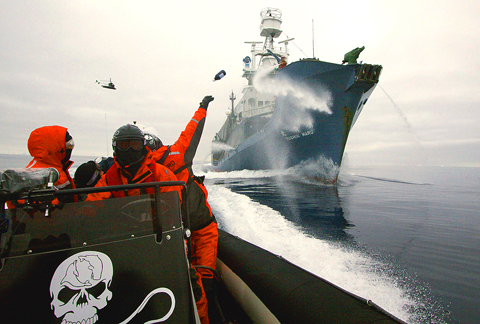Japanese whalers were accused yesterday of injuring two activists in a high seas clash in the Antarctic and of deploying a new “military grade” acoustic weapon against protesters.
One activist was cut and bruised after being knocked over by a high pressure blast of water and the other was hit in the face by a metal ball thrown by the whalers, the Sea Shepherd Conservation Society said.
Both men had been on small inflatable boats launched from the group’s ship, the Steve Irwin, to “harass the [Japanese whaling] fleet and to hurry them along,” Sea Shepherd said in a statement.

PHOTO: AP
The environmental group, which has been accused by Japan of “eco-terrorism” for its attempts to disrupt the annual whale hunt, said the whalers had used a new “acoustic weapon” against protesters.
“The factory ship the Nisshin Maru [No. 1] and the two harpoon vessels in the fleet are equipped with long range acoustical devices,” it said. “This is a military grade weapon system that sends out mid to high frequency sound waves designed to disorient and possibly incapacitate personnel. It is basically an anti-personnel weapons system.”
The Steve Irwin retreated when within range of the acoustic weapon but generally had “a very successful day,” captain Paul Watson said.
“All we need to do is to keep them running and to keep them from whaling and that is exactly what we are doing,” he said.
A spokesman for Japan’s Institute of Cetacean Research would not confirm that the fleet was using sound waves against the activists.
“We can neither confirm nor deny the strategies employed by the Japanese research vessels to protect themselves from the criminal actions committed by the Dutch vessel,” Glenn Inwood told Australia’s national AAP news agency. “We can say, however, that all legal means available will be used to ensure these pirates do not board Japanese ships or threaten the lives of the crews or the safety of the vessels.”
An international moratorium on commercial whaling was imposed in 1986 but Japan kills hundreds each year in the name of “research.”

When Shanghai-based designer Guo Qingshan posted a vacation photo on Valentine’s Day and captioned it “Puppy Mountain,” it became a sensation in China and even created a tourist destination. Guo had gone on a hike while visiting his hometown of Yichang in central China’s Hubei Province late last month. When reviewing the photographs, he saw something he had not noticed before: A mountain shaped like a dog’s head rested on the ground next to the Yangtze River, its snout perched at the water’s edge. “It was so magical and cute. I was so excited and happy when I discovered it,” Guo said.

Chinese authorities said they began live-fire exercises in the Gulf of Tonkin on Monday, only days after Vietnam announced a new line marking what it considers its territory in the body of water between the nations. The Chinese Maritime Safety Administration said the exercises would be focused on the Beibu Gulf area, closer to the Chinese side of the Gulf of Tonkin, and would run until tomorrow evening. It gave no further details, but the drills follow an announcement last week by Vietnam establishing a baseline used to calculate the width of its territorial waters in the Gulf of Tonkin. State-run Vietnam News

TURNAROUND: The Liberal Party had trailed the Conservatives by a wide margin, but that was before Trump threatened to make Canada the US’ 51st state Canada’s ruling Liberals, who a few weeks ago looked certain to lose an election this year, are mounting a major comeback amid the threat of US tariffs and are tied with their rival Conservatives, according to three new polls. An Ipsos survey released late on Tuesday showed that the left-leaning Liberals have 38 percent public support and the official opposition center-right Conservatives have 36 percent. The Liberals have overturned a 26-point deficit in six weeks, and run advertisements comparing the Conservative leader to Trump. The Conservative strategy had long been to attack unpopular Canadian Prime Minister Justin Trudeau, but last month he

Four decades after they were forced apart, US-raised Adamary Garcia and her birth mother on Saturday fell into each other’s arms at the airport in Santiago, Chile. Without speaking, they embraced tearfully: A rare reunification for one the thousands of Chileans taken from their mothers as babies and given up for adoption abroad. “The worst is over,” Edita Bizama, 64, said as she beheld her daughter for the first time since her birth 41 years ago. Garcia had flown to Santiago with four other women born in Chile and adopted in the US. Reports have estimated there were 20,000 such cases from 1950 to